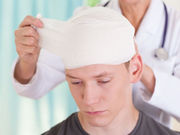Adolescents with lingering effects may need cognitive behavioral therapy, too
TUESDAY, Sept. 13, 2016 (HealthDay News) — For teenagers with lingering symptoms after a concussion, collaborative care may speed their recovery, according to a study published online Sept. 13 in Pediatrics.
Carolyn McCarty, Ph.D., a researcher at Seattle Children’s Hospital, and colleagues recruited 49 teenagers who’d suffered a concussion related to sports or recreation, and had persistent symptoms for at least a month. They randomly assigned each teen to a collaborative care intervention model with embedded cognitive behavioral therapy, care management, and psychopharmacological consultation, or usual care.
Six months into the study, only 13.0 percent of participants in the collaborative care group said they still had high levels of postconcussive symptoms. That compared with 41.7 percent of teens who’d received usual care. More than three-quarters (78.0 percent) also had at least a 50 percent drop in depression symptoms, versus 45.8 percent in the usual care group.
“Orchestrated efforts to systematically implement collaborative care treatment approaches for slow-to-recover adolescents may be useful given the reductions in postconcussive and co-occurring psychological symptoms in addition to improved quality of life,” the authors write.
Full Text (subscription or payment may be required)
Copyright © 2016 HealthDay. All rights reserved.








